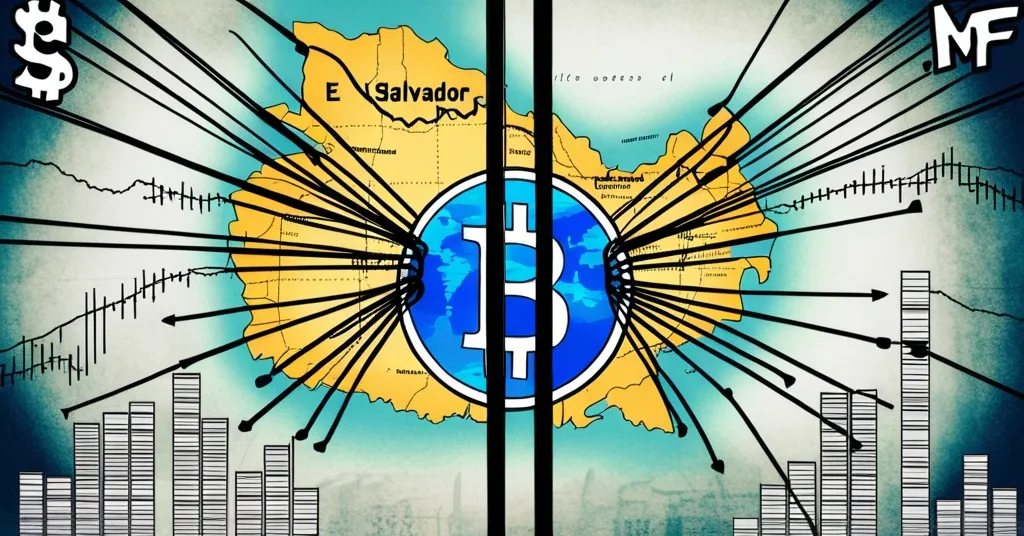El Salvador Scales Back Bitcoin Use in $1.4B IMF Loan Agreement

El Salvador’s Practical Change in Bitcoin Policy
El Salvador is adjusting its ambitious Bitcoin strategy by agreeing to limit its use, a move tied to a $1.4 billion loan agreement with the International Monetary Fund (IMF). This decision is central to the country’s efforts to reduce its debt-to-GDP ratio, a key indicator comparing a country’s debt to its economic output, and stabilize its economy.
- El Salvador curtails Bitcoin use as part of a $1.4 billion IMF loan deal.
- Public sector Bitcoin activities and mandatory merchant adoption are reduced.
- Government role in the Chivo Wallet is being phased out.
- IMF emphasizes the speculative risks associated with Bitcoin, meaning the potential for Bitcoin’s value to fluctuate wildly and unpredictably.
In 2021, President Nayib Bukele made a pioneering decision to adopt Bitcoin as legal tender. However, under the current IMF agreement, El Salvador will make Bitcoin adoption by merchants voluntary, scale back public sector Bitcoin activities, and reduce government involvement in the Chivo Wallet, the government-supported cryptocurrency wallet. Despite Bitcoin’s legal status, taxes will still be paid in US dollars.
The IMF has consistently raised concerns about Bitcoin’s volatile nature. They argue, “the potential risks of the Bitcoin project will be diminished significantly in line with Fund policies.” This mirrors a broader strategy by El Salvador to balance embracing the innovation of cryptocurrencies with maintaining financial stability.
Despite these moves, Bitcoin adoption among Salvadorans remains low, with recent polls showing 92% of the population not using Bitcoin for transactions. This marks an increase from 88% earlier in the year, indicating that while Bitcoin is legal, its day-to-day use is limited. The total of IMF and related loans to El Salvador now amounts to nearly $3.5 billion, underscoring the scale of external financial support needed.
Bitcoin advocate and advisor to Bukele, Max Keiser, criticizes the IMF, stating, “Bitcoin use in El Salvador was always voluntary and its usage has never been higher and continues to grow.” His perspective highlights an ongoing debate between cryptocurrency enthusiasts and traditional financial institutions.
El Salvador’s situation reflects a broader trend of attempting to manage national debt and achieve macroeconomic stability. The IMF’s reservations about Bitcoin reflect a cautious stance from global financial bodies regarding Bitcoin’s volatility. By limiting Bitcoin, El Salvador aims to align with traditional financial systems and secure necessary financial aid.
Future Implications
The changes in El Salvador’s Bitcoin policy pose several implications both domestically and internationally. Will limiting Bitcoin affect its long-term role in El Salvador’s economy? Here are some key considerations:
- Economic Stability: Aligning with traditional financial norms could help stabilize El Salvador’s economy in the short term. However, the reduced emphasis on Bitcoin might slow down potential technological advancements and economic diversification.
- International Impact: Other countries considering adopting Bitcoin as legal tender will closely observe El Salvador’s experience. This could influence their decisions, either reinforcing caution or highlighting Bitcoin’s potential benefits.
- Balancing Innovation and Tradition: The challenge lies in fostering Bitcoin’s innovative potential while ensuring financial stability. El Salvador’s approach may serve as a case study for finding this balance.
Ultimately, while El Salvador’s initial Bitcoin adoption was groundbreaking, the current policy moderation reflects a necessary pragmatism. As these policies evolve, the outcomes could provide valuable lessons for countries navigating similar digital currency paths. The world will be watching to see if El Salvador can ultimately merge the boldness of Bitcoin with the stability of established financial systems.



